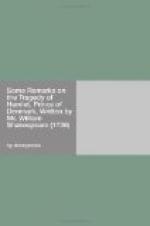Another Reason why we ought to bear with more Patience the Sufferings of a virtuous Character, is the Reflection on the future Rewards prepared for such, which is more suitable to the Moral Maxims established in a Christian Country. Besides, had it pleased our Author to have spared Hamlet’s Life, we had been deprived of that pleasing Sensation which always (as I have else where observed) accompanies a Consciousness that we are moved as we ought to be; which we most assuredly are, when we feel Compassion rise in us for the young Prince’s Death in the last Scene. I shall just touch upon one Thing more, and then I shall end these Reflections.
I am very sensible that our Nation has long been censur’d for delighting in bloody Scenes on the Stage, and our Poets have been found fault with for complying with this vicious Taste. I cannot but own, that there is a great deal of Justice in these Complaints; and must needs be of Opinion, that such Sights should never be exhibited but in order, visibly, to conduce to the Beauty of the Piece. This is sometimes so much the Case, that Action is often absolutely necessary. And to come more particularly to the Subject now in hand, I desire any unprejudiced Man, of any Nation whatever, (if such can be found) who understands our Language, to consider whether the Appearance of the Ghost, and the Deaths of the several principal Personages, (with whatever else may offend the Delicacy I mention) could possibly have that great, that noble Effect, by being told to the Audience, as they most undoubtedly have, by being brought on the Stage. If this Matter be well examined with all possible Candour, I am well perswaded that it would be found in the End, that this Piece would, by the Method I speak of, loose half its Beauty.
The French, (as has been often observ’d) by their Rules of Criticism, have voluntarily imposed on themselves an unnecessary Slavery; and when little Genius’s among them have written Tragedies with these Chains on, they have made most miserable work of it, and given Plays entirely void of Spirit. Even the great Genius’s in that Nation, such as Corneille and Racine, and Mr. De Voltaire (which last being capacitated by having liv’d among us, and by learning our Language, to judge of the Defects and Merits of both Nations, is highly sensible of the Truth of what I now say, as appears in his Preface to his Brutus) even they have been forced to damp their Fire, and keep their Spirit from soaring in almost all their Pieces; and all this is owing to the false Notions of Decency, and a Refinement of Taste among our Neighbours, which is getting now to such a Height, that so far from being able to bear the Representation of Tragical Actions, they are hardly able to bear any Subjects which turn upon the weightier Passions; such as Ambition, Revenge, Jealousy, &c. The Form of their Government, indeed, is of such a Nature, that many Subjects cannot




